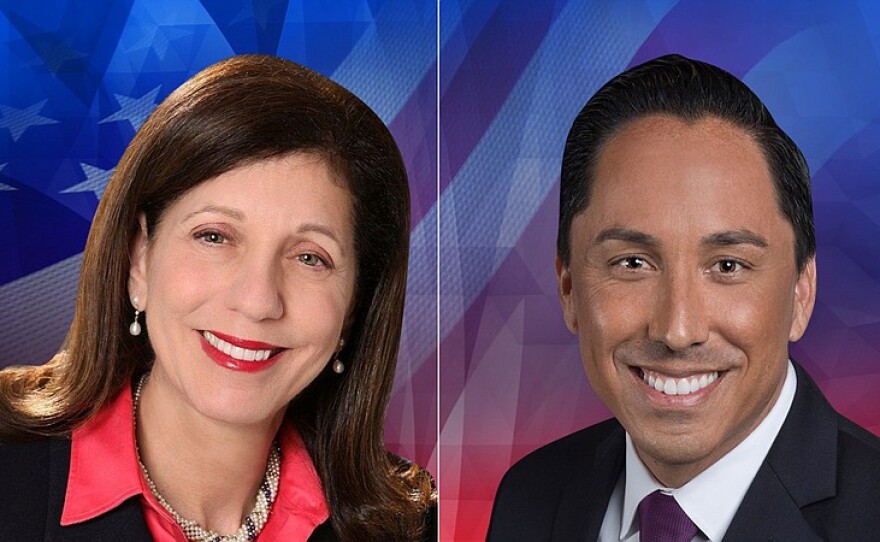Todd Gloria Leads In San Diego Mayoral Race
State Assemblymember Todd Gloria appears poised to win the San Diego mayor's race. This morning he holds a 13 percentage point lead over City Councilmember Barbara Bry (BREE). Gloria had big institutional backing from business groups, organized labor and the county Democratic party. Speaking to the media Tuesday night, he said the next mayor will face big challenges, including climate change, homelessness and COVID-19. TG: A San Diego of old would have ignored these crises, let it fester, let inaction rule the day and let special interests have their way. But in our new San Diego we will lead. We will unite. Bry painted herself as the anti-establishment candidate, and sought to build a coalition of Democrats, Republicans and independents. Speaking to the media Tuesday night, she acknowledged she was behind — but did not concede. BB: We are behind, but there's still a lot of votes left to count. I remember that in the primary we were behind on election night and over the next few weeks we made up the ground as more votes were counted. Bry's deficit is much bigger this time around, however. She would need a large majority of the remaining uncounted votes to pull off an upset win. Democrat candidate Terra Lawson-Remer appears poised to win the race for the District 3 county board of supervisors seat against incumbent Republican Kristin Gaspar. Though the race has NOT been called as of this morning. Lawson-Remer says the district is rapidly shifting and voters care about issues like climate change. And that's why she is up by almost 20 percentage points this morning. “I was going through the numbers and we have about 3,500 people who have either donated or volunteered and that is an incredible grassroots surge.” If Lawson-Remer holds on to her lead, it would give the county board a Democratic majority, after decades of Republican control. It’s Wednesday, November 4th. This is San Diego News Matters from KPBS News. I’m Anica Colbert. Stay with me for more of the local news you need to start your day. There’s a lot going on in the Presidential race with a number of battleground states still too close to call. Meanwhile, President Trump falsely claimed victory overnight. But today we’re focusing on the crucial local races. There are still some too close to call. This morning we have KPBS Roundtable Host Mark Sauer to talk about the early election results. He spoke with KPBS’ Deb Welsh….Here’s that interview. That was KPBS roundtable host mark sauer speaking with KPBS’ deb welsh. Coming up on the podcast, a closer look at the California proposition. That’s next after this quick break. We're still waiting for final numbers on local measures and state propositions. KPBS Editor Tom Fudge has this roundup of the latest results. Two controversial state propositions would increased taxes for commercial property in California, while the other would bring back affirmative action. The first, prop 15 is losing, by a small margin. The affirmative action prop 16 has only 44 percent of the vote. State proposition 22 appears headed for victory. That one would allow drivers with rideshare companies, like Uber, to remain independent contractors. In San Diego, it looks like residents will soon be voting in district-only elections for School Board, given the wide lead held by Measure C. Voter seemed to have approved a hight limit exception in order to redevop the Midway district. And while a strong majority voted in favor of a nearly billion dollars bond to create affordable housing, so far it's well short of the two thirds majority it needs. SOQ. And Those ballot propositions shattered fundraising records to try to sway your vote. CapRadio's Nicole Nixon has more. Three quarters of a billion dollars. That's how much has been spent so far on this year's 12 ballot initiatives. The most expensive fight by far is Proposition 22, which would classify app-based drivers as independent contractors. Tech companies like Uber, Lyft and DoorDash have spent a combined 200 million on it. LEVINSON: "The amount of money really is absolutely astonishing." <<:04>> Jessica Levinson is a professor at Loyola Law School. LEVINSON: It shows that there's so much at stake this election cycle. If you look at how much money for instance, the gig economy companies have spent, it shows how much money they think they might lose if they don't win this election. <<:15>> Three other ballot propositions have also become 100-million-dollar fights this year — hey deal with commercial property taxes, rent control and dialysis clinic regulations. SOQ. Stay tuned to KPBS online, on the radio and on TV, we will have the latest developments and critical analysis as results continue to come in. That’s it for the podcast today. Thanks for listening and have a great day.


